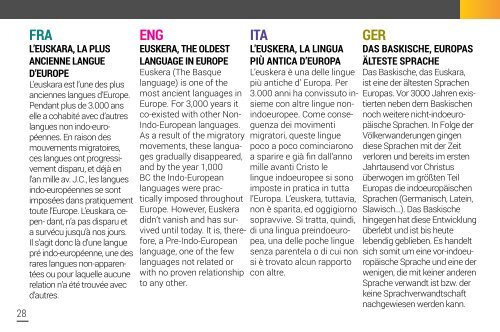PICCOLO DIZIONARIO D´EUSKERA KLEINES WÖRTERBUCH BASKISCH
R56nOO
R56nOO
You also want an ePaper? Increase the reach of your titles
YUMPU automatically turns print PDFs into web optimized ePapers that Google loves.
28<br />
FRA<br />
ENG<br />
L’EUSKARA, LA PLUS<br />
ANCIENNE LANGUE<br />
D’EUROPE<br />
L’euskara est l’une des plus<br />
anciennes langues d’Europe.<br />
Pendant plus de 3.000 ans<br />
elle a cohabité avec d’autres<br />
langues non indo-européennes.<br />
En raison des<br />
mouvements migratoires,<br />
ces langues ont progressivement<br />
disparu, et déjà en<br />
l’an mille av. J.C., les langues<br />
indo-européennes se sont<br />
imposées dans pratiquement<br />
toute l’Europe. L’euskara, cepen-<br />
dant, n’a pas disparu et<br />
a survécu jusqu’à nos jours.<br />
Il s’agit donc là d’une langue<br />
pré indo-européenne, une des<br />
rares langues non-apparentées<br />
ou pour laquelle aucune<br />
relation n’a été trouvée avec<br />
d’autres.<br />
EUSKERA, THE OLDEST<br />
LANGUAGE IN EUROPE<br />
Euskera (The Basque<br />
language) is one of the<br />
most ancient languages in<br />
Europe. For 3,000 years it<br />
co-existed with other Non-<br />
Indo-European languages.<br />
As a result of the migratory<br />
movements, these languages<br />
gradually disappeared,<br />
and by the year 1,000<br />
BC the Indo-European<br />
languages were practically<br />
imposed throughout<br />
Europe. However, Euskera<br />
didn’t vanish and has survived<br />
until today. It is, therefore,<br />
a Pre-Indo-European<br />
language, one of the few<br />
languages not related or<br />
with no proven relationship<br />
to any other.<br />
ITA<br />
GER<br />
L’EUSKERA, LA LINGUA<br />
PIÙ ANTICA D’EUROPA<br />
L’euskera è una delle lingue<br />
più antiche d’ Europa. Per<br />
3.000 anni ha convissuto insieme<br />
con altre lingue nonindoeuropee.<br />
Come conseguenza<br />
dei movimenti<br />
migratori, queste lingue<br />
poco a poco cominciarono<br />
a sparire e già fin dall’anno<br />
mille avanti Cristo le<br />
lingue indoeuropee si sono<br />
imposte in pratica in tutta<br />
l’Europa. L’euskera, tuttavia,<br />
non è sparita, ed oggigiorno<br />
sopravvive. Si tratta, quindi,<br />
di una lingua preindoeuropea,<br />
una delle poche lingue<br />
senza parentela o di cui non<br />
si è trovato alcun rapporto<br />
con altre.<br />
DAS <strong>BASKISCH</strong>E, EUROPAS<br />
ÄLTESTE SPRACHE<br />
Das Baskische, das Euskara,<br />
ist eine der ältesten Sprachen<br />
Europas. Vor 3000 Jahren existierten<br />
neben dem Baskischen<br />
noch weitere nicht-indoeuropäische<br />
Sprachen. In Folge der<br />
Völkerwanderungen gingen<br />
diese Sprachen mit der Zeit<br />
verloren und bereits im ersten<br />
Jahrtausend vor Christus<br />
überwogen im größten Teil<br />
Europas die indoeuropäischen<br />
Sprachen (Germanisch, Latein,<br />
Slawisch...). Das Baskische<br />
hingegen hat diese Entwicklung<br />
überlebt und ist bis heute<br />
lebendig geblieben. Es handelt<br />
sich somit um eine vor-indoeuropäische<br />
Sprache und eine der<br />
wenigen, die mit keiner anderen<br />
Sprache verwandt ist bzw. der<br />
keine Sprachverwandtschaft<br />
nachgewiesen werden kann.


